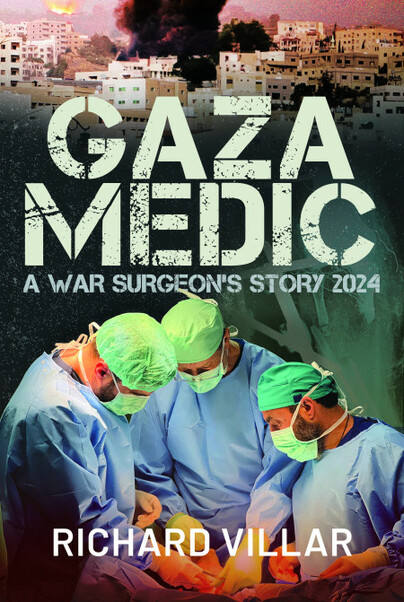Author Guest Post: Richard Villar
Remembering 7 October 2023: A War Surgeon’s Reflections on Gaza
by Richard Villar
On 7 October 2023, a new chapter of the Israel-Palestine conflict began, plunging the already fragile region into another cycle of violence. This date is now etched in the memories of many, as the day the war between Palestinians and Israelis reignited with unprecedented intensity. As someone who recently served as a war surgeon in Gaza, I find myself frequently reflecting on that day, the ensuing months, and the indelible impact it has had on the people of the region – both Palestinians and Israelis.


Five months after the conflict erupted, I was deployed to Central Gaza as part of a humanitarian mission, working with an Emergency Medical Team (EMT) in Deir al-Balah. My role, funded by Medical Aid for Palestinians (UK) and the International Rescue Committee (USA), was to provide medical aid to those caught in the crossfire. In the process, I bore witness to the unimaginable suffering of civilians who, regardless of their identity, found themselves trapped in one of the most dangerous environments on Earth.
The memories of my time in Gaza have not faded and are the foundation of my forthcoming book, Gaza Medic: A War Surgeon’s Story 2024, soon to be published. In the book, I recount the harsh realities faced by medical teams working under extreme conditions in conflict zones. But my interests are not about promoting the book alone. They are about honouring the resilience and courage of those affected by the conflict – on all sides.


The Humanitarian Crisis in Gaza
Gaza, with its dense population and limited resources, has been a hotspot for conflict for decades. By the time I arrived in Deir al-Balah, the healthcare system was already stretched to breaking point. Resources were scarce, medical supplies rationed, and there was a constant threat of airstrikes. The conflict in Gaza is not just a geopolitical struggle – it is a humanitarian crisis that sees families, children, and communities significantly affected.
In Deir al-Balah, I worked in a 200-bed hospital, Al Aqsa, that had been overwhelmed by the number of injured civilians. We had over 700 patients at one point, many of whom were women and children, in addition to the 3000 Palestinians who had set up temporary shelter in the hospital’s grounds. The patients were not just suffering from injuries inflicted by violence, but also from a lack of necessities. Clean water, sufficient food, and medicines were luxuries that most could not afford and were largely unavailable anyway. The hospitals, too, were not spared; they were often targeted, making them anything but safe havens.


Despite the dangers, we worked day and night, performing operations that under normal circumstances would have seemed impossible given the limited equipment. As missiles and bombs fell and drones buzzed overhead, the dedication of my fellow medics was unwavering. It was in this crucible of chaos that I witnessed humanity at its finest – when people come together in the face of adversity, transcending politics and divisions.
Reflecting on 7 October 2023
The war that began on 7 October 2023 was not entirely unexpected, but its scale and ferocity shocked the world. For many, this conflict is yet another chapter in a long, tragic history, but for those living through it, each day brings new challenges, fears, and losses. As a surgeon, and I am privileged to be one, my primary focus was always on the people, on alleviating suffering and saving lives. Yet it is impossible to ignore the fact that, behind every patient, there is a story shaped by the harsh realities of war.
In Gaza, those stories often began in the early hours of the morning, as the sounds of explosions and gunfire echoed through the streets. Families were torn apart, homes reduced to rubble, and yet the people endured. I often wondered where they found the strength, but in the middle of this extreme devastation, there were glimmers of hope – small acts of kindness, moments of solidarity, and an unbreakable will to survive.
That is what I hope I have conveyed in Gaza Medic. The book is not just a retelling of my experiences as a war surgeon, written from my diary at the time, it is a tribute to the resilience of human spirit in times of unimaginable hardship. It describes a people who refuse to be defined by the conflict, and who have found ways to keep going even when everything around is falling apart.


The Medical Team’s Role
As medical professionals, our role in such situations goes beyond providing physical care. We are witnesses to the effects of war, not only in terms of the injuries we treat but also in the trauma that lingers long after the wounds have healed. The emotional scars of conflict are often harder to see, but they are just as real. Every patient I treated carried the weight of loss – loss of family, loss of security, loss of hope.
How well I recall one young boy who was brought to the hospital after a missile strike. He had lost his leg, but what struck me most was not his physical injury but the look in his eyes – a mixture of fear, confusion, and sorrow. It was a look I saw many times during my mission, and it serves as a powerful reminder of the real cost of war. For every casualty on the battlefield, there are countless more whose lives are forever changed.


A Call for Compassion and Understanding
The first anniversary of 7 October 2023 may mark a tragic milestone, but it also serves as a call for reflection. As we remember this date, it is critical to never forget that behind the headlines and political rhetoric are real people – individuals who are trying to survive in circumstances beyond their control. Whether in Gaza or Israel, the pain of loss is universal, and the desire for peace is shared by all. At least the majority.
The long-term effects are incalculable. Please tell me how a young doctor, in their late twenties, can withstand a mass casualty event in their hospital each day for a year, and not be permanently affected. I would suggest that is impossible and must hope such doctors are in due course honoured, and never forgotten.
My time in Gaza taught me that while conflict may divide nations, it is our shared humanity that can unite us. The medical team with which I worked came from diverse backgrounds and nationalities, yet we were driven by the same goal – to save lives. In those moments, the politics of the conflict were irrelevant. What mattered was the person in front of us, in need of care.
In writing Gaza Medic: A War Surgeon’s Story 2024, I have tried to give readers a deeper understanding of the realities faced by medical professionals in conflict zones, but more importantly, I hope to shine a light on the resilience of the human spirit. The 7 October 2023 may be remembered as the day the war began, but it should also serve as a reminder of the importance of compassion, understanding, and the urgent need for peace.
War is not inevitable, and neither is suffering. With enough will, there is always the possibility of a better, more peaceful future for all.
***

Order your copy here.

